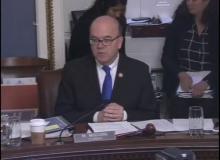Medicare-for-All – the health care proposal that could play a key role in the 2020 presidential elections – got its first airing on Capitol Hill April 30 as the House Rules Committee discussed H.R. 1384.
The Medicare for All Act of 2019, introduced Feb. 27 by Rep. Pramila Jayapal (D-Wash.) and Rep. Debbie Dingell (D-Mich.), would provide universal coverage at the time of birth in the United States or upon the establishment of residency. The bill would make it unlawful for a private health insurer to sell coverage that duplicates the benefits of the Medicare-for-All system, and would prohibit employers from providing health insurance coverage that is provided by the Medicare-for-All system. At press time, the bill currently had 108 cosponsors, all Democrats.
Given the challenges the bill will face getting through the Democrat-controlled House – and the likelihood that the Republican-controlled Senate won’t even touch it – one Rules Committee member questioned why the hearing was being held.
Rep. Debbie Lesko (D-Ariz.) acknowledged that there are problems with health care and called for bipartisanship, noting problems of this magnitude need both sides of the aisle working together, but said she does not think H.R. 1384 has any chance of passage.
“Most, if not all, Republicans in the House are probably going to vote against it if it gets up for a vote and certainly the Senate is not going to hear it,” Rep. Lesko said. “I don’t know why we are doing this.”
Witnesses called by the committee offered differing takes on whether Medicare-for-All is feasible in the United States.
“A Medicare-for-All system of the type envisioned in the Jayapal bill is a huge step from our current system, which relies largely on private insurers,” according to Dean Baker, PhD, senior economist at the Center for Economic and Policy Research. “The list of transition problems that would arise is too long to address here. However, I would argue that it is essential that any move to such a system be done piecemeal since a quick changeover would virtually guarantee confusion and quite possibly lead to some people going without care.”
Indeed, many ideas contained in a number of different Medicare-for-All proposals could be implemented “without a major reorganization of the health care system,” according to Sara Collins, PhD, vice president of health care coverage and access at The Commonwealth Fund. “For example, paying providers in commercial plans at prices closer to those in Medicare or allowing the secretary of Health and Human Services to negotiate prescription drug prices have potential to slow health care cost growth and would not require an immediate shift to a single-payer system.
“On the other hand,” she continued, “moving piecemeal also involves trade-offs including the possibility, based on the experience of the [Affordable Care Act], that additional steps may take some time to achieve.”
Grace-Marie Turner, president of the Galen Institute, noted that many people, regardless of whether their coverage is public or private or not at all, have frustrations with the current health care delivery system.
“But it is hard to see how consumers would be more empowered when dealing with a single government payer,” she said. “In a country that values diversity, will one program with one list of benefits and set of rules work for everyone?”
If physician payment under Medicare-for-All were closer to what Medicare currently pays, “physicians would see 30% cuts. These payment reductions would gradually grow over time,” Ms. Turner testified.
Despite discussion of pay cuts, doctors invited to testify spoke in favor of a single-payer system.
“All I want is to practice medicine in a world where I no longer have to watch a patient walk out of the ER without medical care that could save their life because they are worried about going bankrupt,” said Farzon Nahvi, MD, an emergency physician at New York University Medical Center who serves on the board of directors for the New York Metro chapter of Physicians for a National Health Program. “From my perspective on the ground, the solution has to involve approaching medical care in just the same way we approach educating our children, maintaining our roads, and supporting our troops. This means treating health care like any other public good and creating a universal health care system like Medicare-for-All so that when they’re at their most vulnerable, my patients never have to make any consideration except to simply do what they need to do in order to get better.”
Doris Browne, MD, immediate past president of the National Medical Association agreed, calling for the adoption of “a system of universal coverage that minimizes administrative medical costs. It does not matter what label is used. Such an undertaking must include preventive care, screening, early detection, and treatment. The coverage would allow patients the ability to chose their provider, primary care or specialist. Care should be the same no matter where you live, rural or urban, California or Mississippi, and not be restricted based on language, age, gender, or race/ethnicity.”
Rep. Jim McGovern (D-Mass.), chairman of the Rules Committee, wrapped up the hearing noting that, even with some dissenting viewpoints, “what we have shown today, I believe, is that Medicare-for-All is possible; that we can build on the principles of the Affordable Care Act to make even bolder reforms. Reforms that would give doctors like Dr. Browne and Dr. Nahvi the ability to treat patients and give them the best care every time without letting cost dictate medical decisions. ... If you walk away with nothing else today, know that we have the ability to do that. Medicare-for-All is possible. It is reasonable. It can move forward and I think it should.”

